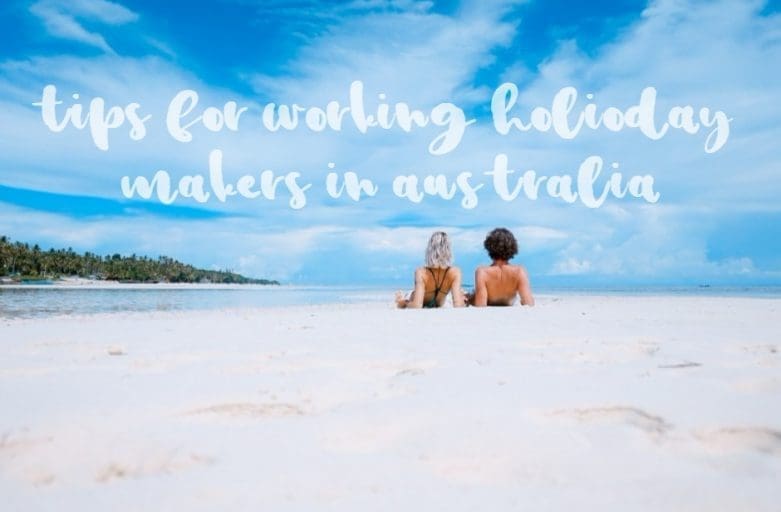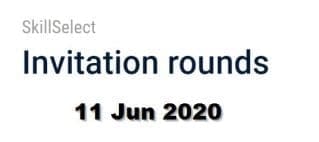Tips for working holiday makers in Australia.
Did you get your Working Holiday visa and are you all excited to start working in Australia? Let’s make it really easy for you to get everything ready to get going. Just follow the steps below:
- Apply for your Tax File Number (TFN)
- Get an Australian bank account
- Get an Australian mobile phone number
- Join a Job Agency
- Take a Training Course if needed (RSA, RCG, White Card)
Job Hunting Tips
- Dress appropriately and be professional. For hospitality work, for example, black shoes and trousers and a white shirt are usually expected.
- Have your resume (C.V.) ready in English (no more than 1-2 pages) and make sure that your contact details as phone number and e-mail address are provided. Have a digital copy ready in your mailbox / on a USB stick, so that you can e-mail it to an employer if they ask about it.
- Make sure your phone is always charged and switched on, so you don’t miss any calls.
- Be honest and reliable. Let employers know how long you are available and give notice when you plan to leave.
- Get references if you can. Having a good reference is very important in Australia.
- Check everywhere for employment opportunities: on hostel notice boards, in local newspapers, on gumtree.com.au or on the website of recruitment agencies.
- Make sure you have proof of all your qualifications, especially if you are looking for a skilled job such as nursing or teaching. For some jobs, you might need to get extra health/character checks (for example if you’re working with children).
- Keep in mind that there is much competition, so be creative in selling yourself and don’t give up easily after a rejection. Keep trying!
Keep in mind you can’t work more than 6 months for one employer on a W&H visa, although there are some exceptions.
Apply for your Tax File Number (TFN)
If you are planning to work in Australia, then you will need a Tax File Number (TFN). This is legally required for employers to pay tax on your behalf.
The easiest and quickest way to apply for a TFN is online at the Australian Taxation Office. Important: Make sure you apply on the Australian Government website*. You shouldn’t pay for your application. There are many TFN application websites on the internet that will charge you money! You should get your TFN straight away.
Get an Australian bank account
If you’re coming to Australia on a Working Holiday Visa, you may want to open a bank account – particularly if you intend to work, so you can be paid. Most employers won’t pay you into an overseas bank account. The main banks in Australia are Westpac, ANZ, NAB, Commonwealth, and St.George. If you are in Australia for one year then it will help if you open an account within 6 weeks of arriving. Some of the banks will let you open an account even before you’ll come to Australia.
Get an Australian mobile phone number
If you’re traveling in Australia, you probably would like to have an Australian mobile phone number. Not only to call your new friends made in Australia, or your family at home but also to hear from potential employers about job offers as soon as possible. When you’ve brought a sim lock free phone from home, it’s very easy to get started. Simply buy a sim card, top it up with a prepaid cap register your name and you’re connected!
Join a Job Agency
One of the easiest ways to get work in Sydney is to join job agencies. We recommend you to take some time to send all your details, including your availability and C.V. to as many agencies as you can, therefore maximising your chances of finding the perfect job.
Most common jobs taken by work and holiday makers are:
- Admin / Office / Secretarial / Clerical Work / IT
- Charity / Fundraising / Volunteering
- Childcare / Teaching
- Construction / Labour
- Hospitality / Tourism
- Nanny / Au Pair
- Nursing / Health Care
- Telecommunication / Promotion / Sales
Take a Training Course
If you are seeking work in hospitality or construction (both industries always have plenty of available positions), you need to complete a government-approved training course.
Hospitality
If you are looking for work in the Hospitality industry – in particular, bar work, or working in licensed restaurants – you will require a qualification called “Responsible Service of Alcohol” (RSA). This is a compulsory course for the service of alcohol in bars and restaurants. After completing the course, you can start working immediately.
The “Responsible Conduct of Gambling” (RCG) is required for staff working in establishments where there are gaming machine activities. Many pubs and clubs in Australia have gaming machines, so it is extremely beneficial to have this qualification when applying for jobs.
Construction
Working on a building site requires a general occupational health and safety certificate. This is sometimes referred to as a “White Card“. This is required for contractors, laborers, tradespeople, plumbers, electricians, carpenters, supervisors, project managers, etc.
Follow us on facebook if you like it here, so you’ll be first to know about updates on this page.
Health Insurance
Medical treatment can be very expensive in Australia, so it is strongly advised to have both a travel and a private health insurance to cover yourself if anything happens.
As a tourist, you are not covered by Australia’s national health scheme, unless there is an agreement between Australia and your country.
The Australian Government has signed Reciprocal Health Care Agreements (RHCA) with the governments of Belgium, Finland, Republic of Ireland, Italy, Malta, the Netherlands, New Zealand, Norway, Slovenia, Sweden and the United Kingdom.
This means that travelers from these countries are entitled to (limited) subsidized health services for immediately ‘medically necessary’ treatment while visiting Australia, covered by Medicare Australia.
It is recommended that you take out health insurance for yourself (and your family) for the duration of your stay in Australia. You can organize your health insurance through a health insurance provider or travel agent in your home country or locally in Australia.
Farm Work
Are you looking to work in a regional area of Australia because you want your second-year working holiday visa, or just love to have the experience? Have a look at what types of farm work is available to you. From grape harvesting in Berri to mango picking in Darwin, each year thousands of people find work helping to bring in the fruit and vegetable harvests. The season differs in each region, so you could work yourself around the country to work with the products you love, at your own pace. Have a look at Australia’s harvest map to find more information about harvest labor in specific states. Get your FREE copy of the National Harvest Guide today and find all the information you need about farm work and harvesting opportunities. Updated monthly, you can download the Harvest Guide for free in PDF format.
Wwoofing
Volunteering in Australia is a great way of getting involved with a local community. The WWOOF Australia organization was founded in 1971 in the UK and stands for Willing Workers on Organic Farms (or World Wide Opportunities on Organic Farms). They link volunteers with organic farmers and help share more sustainable ways of living.
On the farms, you can work in exchange for accommodation, meals, and knowledge about organic lifestyles. Travel to and from projects are usually provided.
The work on these farms usually comes down to about half a day (4-6 hours) to get a full day’s board and can be anything (depending on where you go) from planting trees, feeding animals, organizing an arts festival, farming/gardening work to research, environmental work or rescuing turtles. Usually, hours are flexible so you have free days, but you must negotiate this with your host.
You should have a level of physical fitness, maturity, and independence to participate in the program.
There is a small fee from the WWOOF organization to help maintain and develop the WWOOF network. As a WWOOF member, you will receive a book with contact details for over 2400 hosts throughout Australia. Around 240 of these are Certified Organic and approximately 1900 are traditional farms using organic practices.
You can choose a host that most interest you and make direct contact to arrange a stay and become a part of their family. Please remember that you will be staying in their house: the host address is not a hostel.
Contact the host between 5-9pm, not later. Most hosts will not answer bulk e-mails or text messages. E-mails telling the hosts about your interests and skills, as well as why you would like to WWOOF on their property, are more successful.
The hosts will want to check your WWOOF Membership book against your passport or other photo ID when you arrive. If you do not have a membership book, a host can arrange for you to join WWOOF and have your book sent to their address.
Kep in mind voluntary jobs will not be accepted by the department of immigration for the 2nd year working holiday visa.
Tax Returns & Claims
After you have finished working in Australia and at the end of each financial year (after June 30th every year) you really should claim your TAX BACK – the money is yours after all and you worked hard for it! Ask your employer for a payment summary, showing your total income and the amount of tax withheld. It doesn’t matter if you are in Australia or if you have gone home – you can still claim.
You can also access your retirement savings or pension (superannuation) when you depart from Australia. For more information about this, please visit the website of the Australian Taxation Office.
If you like it here in Australia, your W&H visa is about to expire and you want to extend your stay – we’re here to help. Give us a call or contact us
Feel free to ask a question or leave a comment below.



